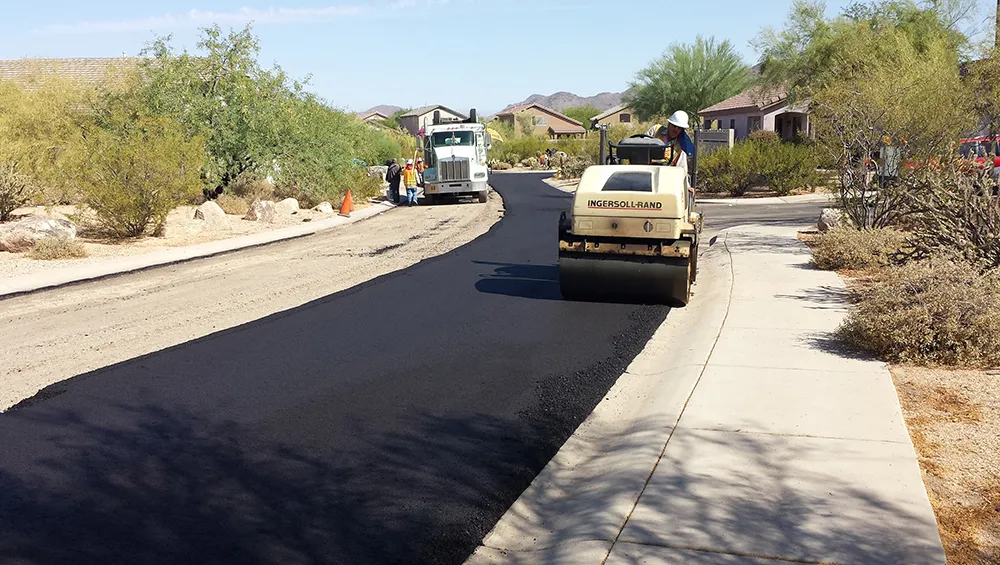The road maintenance crisis in the United Kingdom and the United States is deepening amid estimates that it will take millions of dollars to stop highway infrastructure from crumbling, including falling prey to potholes.
A recent report by the BBC in the UK said that at least one municipal council, the city of Leeds, is facing a bill of nearly US$153 million to patch up its potholed roads.
In the United States, Senator Bernie Sanders is t
January 9, 2015
Read time: 4 mins
RSSThe road maintenance crisis in the United Kingdom and the United States is deepening amid estimates that it will take millions of dollars to stop highway infrastructure from crumbling, including falling prey to potholes.
A recent report by the BBC in the UK said that at least one municipal council, the city of Leeds, is facing a bill of nearly US$153 million to patch up its potholed roads.
In the United States, Senator Bernie Sanders is to introduce legislation this month to authorise a $1 trillion, multi-year programme to rebuild roads and bridges and invest in modernisation projects.
The importance of road asset maintenance will be the focus of an upcoming major conference in Paris, the Pavement Preservation and Recycling Summit. Transport concerns voiced by many road users will be at the heart of the debates at the PPRS event from February 22-25.
Analysts on both side of the Atlantic Ocean have said costs to clear a backlog of repairs are mounting year on year. The UK county of Gloucestershire will need $130 million to reduce its backlog of pothole repairs. One local municipality alone that makes up greater London, Islington, must find around $119 million to fill in its potholes.
Details of the costs in the UK come after it was revealed how $9 billion of government money will be spent to improve England's roads over the next six years, the BBC reported. While many councils said they did not have a backlog, others said the problem has been "historic" and is getting worse.
In April last year, the UK’s1360 Asphalt Industry Alliance said the problem is rapidly escalating. The alliance claimed that $18 billion is needed in England to handle road maintenance, up from nearly $16 billion in 2013.
In the US, Senator Sanders pointed to a report by the2600 American Society of Civil Engineers that says more than $1.7 trillion is needed just to improve roads, bridges and transit. Nearly one-third of bridges have exceeded their 50-year design life. Almost one-third of America’s major roads are in poor or mediocre condition and 42% of major urban highways are congested. In one state alone, Vermont, civil engineers claim more than one-fifth of paved roads are in poor condition.
But US federal funding for road improvements is in jeopardy, according to the3464 National Asphalt Pavement Association. Federal money provided on average around half of funding for annual state highway and bridge construction and maintenance between 2001 and 2011. The association believes higher gasoline taxes are one option to avoid bankruptcy for the federal Highway Trust Fund.
The issue of road asset maintenance in an age of continuing financial austerity is not confined to the US and UK. Europeans are in two minds about whether their road transport has improved in the past five years, notes the latest2465 European Commission’ Eurobarometer survey and report. According to 38% of respondents, road transport quality had gone up, but 40% said it had dropped, while 18% said there had been no change.
“Insufficient maintenance has created a backlog and is affecting service levels,” said Jean-Francois Corte, secretary general of the World Road Association (3141 PIARC), based in Paris.
“What’s needed right now is at least a medium-term vision to embrace the right type of maintenance, a strong strategy. Because there has been insufficient maintenance, road networks are degrading faster. Many highways authorities don’t have this medium- or long-term approach to highway maintenance because they are bound by their government’s annual budgets.”
Importantly, attendees to the Pavement Preservation and Recycling Summit in Paris next month will learn how, during these austere times, to put the business case forward to ensure more investment is there when and where it is needed.
To find out more about the three-day PPRS 2015 event and register, please visit the official7924 PPRS 2015 website.
A recent publication by PIARC, called The Importance of Road Maintenance, is available as a free download on the PIARC website.
A recent report by the BBC in the UK said that at least one municipal council, the city of Leeds, is facing a bill of nearly US$153 million to patch up its potholed roads.
In the United States, Senator Bernie Sanders is to introduce legislation this month to authorise a $1 trillion, multi-year programme to rebuild roads and bridges and invest in modernisation projects.
The importance of road asset maintenance will be the focus of an upcoming major conference in Paris, the Pavement Preservation and Recycling Summit. Transport concerns voiced by many road users will be at the heart of the debates at the PPRS event from February 22-25.
Analysts on both side of the Atlantic Ocean have said costs to clear a backlog of repairs are mounting year on year. The UK county of Gloucestershire will need $130 million to reduce its backlog of pothole repairs. One local municipality alone that makes up greater London, Islington, must find around $119 million to fill in its potholes.
Details of the costs in the UK come after it was revealed how $9 billion of government money will be spent to improve England's roads over the next six years, the BBC reported. While many councils said they did not have a backlog, others said the problem has been "historic" and is getting worse.
In April last year, the UK’s
In the US, Senator Sanders pointed to a report by the
But US federal funding for road improvements is in jeopardy, according to the
The issue of road asset maintenance in an age of continuing financial austerity is not confined to the US and UK. Europeans are in two minds about whether their road transport has improved in the past five years, notes the latest
“Insufficient maintenance has created a backlog and is affecting service levels,” said Jean-Francois Corte, secretary general of the World Road Association (
“What’s needed right now is at least a medium-term vision to embrace the right type of maintenance, a strong strategy. Because there has been insufficient maintenance, road networks are degrading faster. Many highways authorities don’t have this medium- or long-term approach to highway maintenance because they are bound by their government’s annual budgets.”
Importantly, attendees to the Pavement Preservation and Recycling Summit in Paris next month will learn how, during these austere times, to put the business case forward to ensure more investment is there when and where it is needed.
To find out more about the three-day PPRS 2015 event and register, please visit the official
A recent publication by PIARC, called The Importance of Road Maintenance, is available as a free download on the PIARC website.








